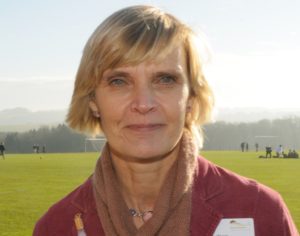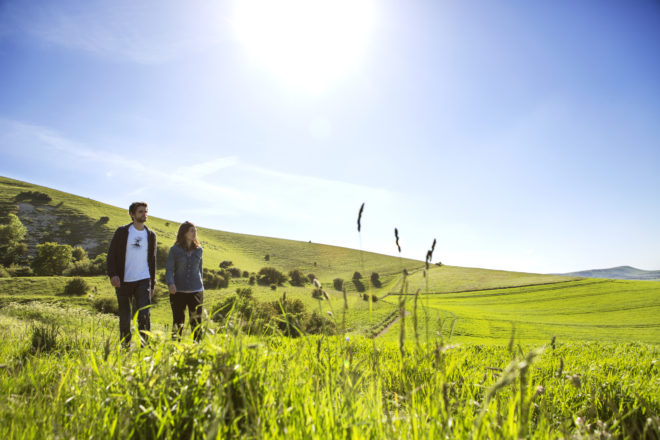Go wild for chalk grassland this July!
July 9, 2020
Ranger talks, Stone Age re-enactments, virtual walks through wildflowers and a fun “meet the sheep” session will be among the highlights as the South Downs National Park celebrates our amazing chalk grasslands this month.
Wild Chalk returns for 2020 – and it’s all going online with an action-packed line-up of films, quizzes and activities that people can enjoy on their mobile phones, tablets or laptops.
The South Downs National Park Authority and Brighton & Hove City Council have joined forces to put on the six-day virtual event, which aims to help people learn more about one of the rarest and most unique habitats on the planet. It builds on the success of the live events that have taken place at East Brighton Park for the past two years.
Wild Chalk 2020 kicks off on Sunday, 19 July, with a day dedicated to our incredible “busy bees”. The Festival will be launched by Professor Dave Goulson, head of biology at the University of Sussex and author of “The Garden Jungle”, who will give us some tips on what we can do to help bees, followed by a Facebook live with National Park Ranger Sophie Brown from the top of the South Downs showing bees using pollinator corridors across farmland. Back in the city, Brighton & Hove City Ranger Sally Graham-Macleod will talk through creating an urban bee bank, before the day rounds off with a storytelling session from modern-day bard Ben Fairlight.
Each day will have an exciting theme focusing on a different aspect of chalk grassland People are also being invited to take part in a daily quiz challenge to be in with the chance of winning a “Wildlife Explorer Pack” prize. Register for the quiz, starting on 19 July, here.

Laura Warren, Events and Engagement Officer for the South Downs National Park, said: “Wild Chalk is one of our most popular headline events and the inevitable impact of COVID-19 has meant we’ve had to do things differently this year and be quite imaginative in our approach.
“We’ve taken elements from the visitor event and transformed them into a fun and educational package that will work well online. This virtual event is a first for us, but we’re really looking forward to engaging with people across the South East.
“There’s something for everyone and all ages, whether you want to tune in for the whole week, or just want to dip into one of the films or activities that appeal to you.
“Our big aim is simply to inspire people! We want people to learn more about chalk grassland and what we can all do to help care for this delicate landscape. It really is a very special habitat, with some of the highest insect and plant diversity you’ll find anywhere in Europe. We’re so lucky to have it on our doorstep in Sussex and Hampshire.”

The themes and highlights for the day will be:
Sunday, July 19 – Busy bees, including bee expert Dave Goulson and a ranger chat with Sophie Brown.
Monday, July 20 – Amazing Grazing, including “Meet the Sheep” with Brighton & Hove City Council Ranger Paul Gorringe.
Tuesday, July 21 – Flower Power, including Dr Dan Danahar and National Park Ranger Jan Knowlson exploring the flowers of Sussex and National Park Ranger Maddy Crews exploring the chalk grassland blooms of Hampshire. Also download a colouring sheet and gets tips in a live colouring-in session!
Wednesday, July 22 – Chalk Talk, including Aimee Felus, of The Aquifer Partnership, making a model of a chalk aquifer and exploring how chalk filters and cleans the water we drink.
Thursday, July 23 – Prehistoric South Downs, including a Facebook Live with Neolithic re-enactor Will Lord demonstrating fire lighting, flint knapping and hide tanning from his Stone Age camp.
Friday, July 24 – Beautiful butterflies, marvellous moths, including Robert Foreman, of Sussex Wildlife Trust, opening a trap to discover which moths inhabit the South Downs.
See the full programme here and check out the National Park’s Facebook, Instagram and Twitter.
- Chalk downland is a big part of what makes the South Downs special.
- Over 30 different species of butterfly can be on the wing at any given time above the South Downs National Park’s chalk grasslands.
- The late naturalist David Bellamy described them as “Europe’s rainforests”.
- Since the Second World War, the UK has lost around 80 per cent of its chalk grasslands. In the South Downs they now cover just four per cent of the National Park’s area, yet they remain one of the richest areas for wildlife. The SDNPA is working with a range of local partners to protect what remains and reverse this process of decline.
